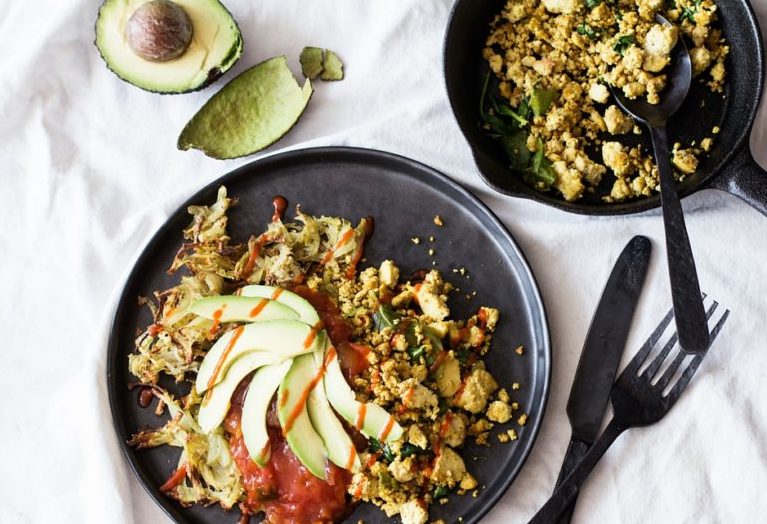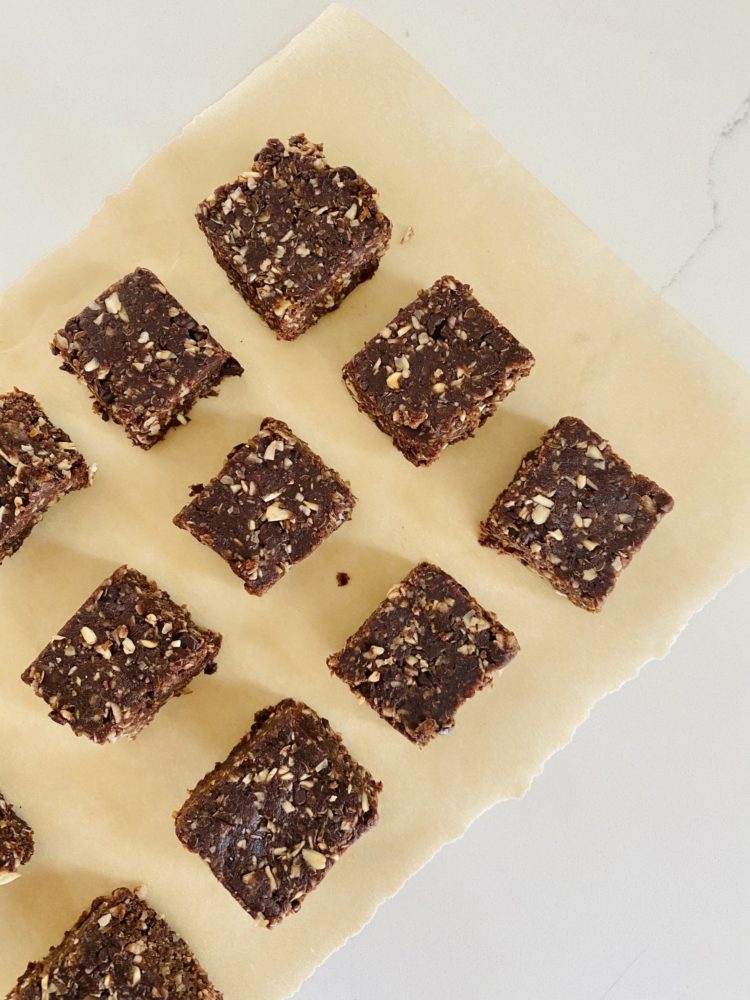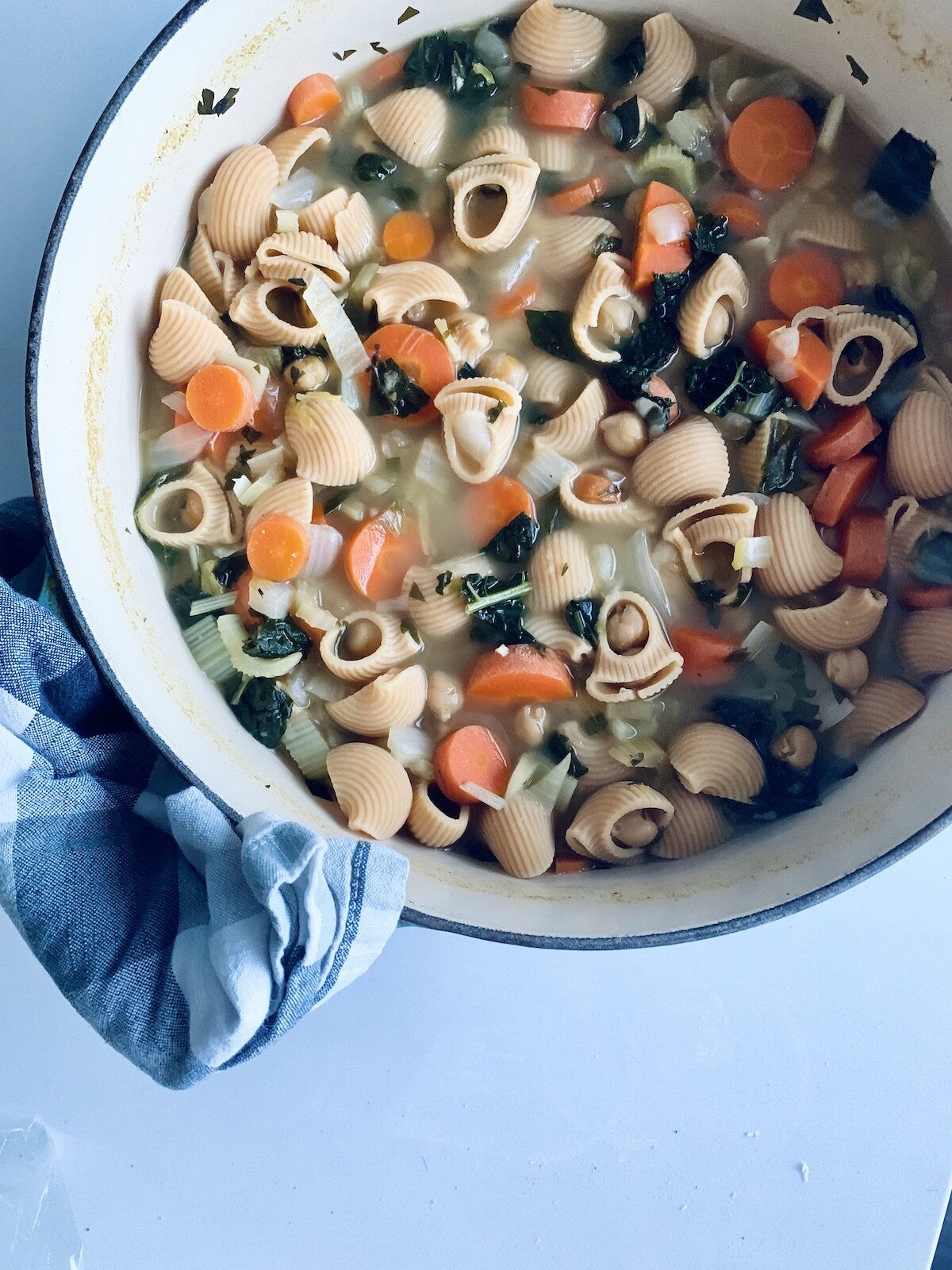Uncomfortably full. Guilt. Regret. Anger. Frustration. Overeating is a common experience among my clients, and it tends to stir up a lot of feelings. It puts you in a vicious cycle of eating too much, feeling regret, trying another diet attempt, and then eventually overeating again. In fact, dieting is the most common solution presented to people who want to stop overeating. But going on another diet will simply keep you in this vicious cycle!
I believe in a different approach – one that takes you out of this cycle, heals the root of your overeating, and helps you have a healthier, happier, and more pleasurable relationship with food. No more guilt, regret, or frustration.
Disclaimer: This post is not intended for anyone with an active eating disorder. Please work with you health care provider if you have concerns about overeating related to an eating disorder.

What does overeating mean?
Overeating is defined as consuming more food than your body needs for energy, often leading to feelings of discomfort or fullness. It can occur in various contexts and is typically characterized by eating beyond the point of hunger or satiety. Overeating can also be perceived. You might have the perception that you’re eating too much food, when in reality you are in fact eating enough food. More on that later.
Overeating can manifest in several ways, including:
- Habit: You are used to cleaning your plate, finishing a package, or serving yourself certain portion sizes.
- Emotional Eating: For many people, food serves as a coping mechanism for managing negative emotions. When faced with stress, sadness, boredom, or anxiety, you may turn to food for comfort, distraction, or numbing.
- Distracted Eating: You might eat without paying attention to what or how much you’re eating. Distractions such as watching television or scrolling through social media while eating can lead to disconnection from your body’s signals that you’re full.
- Cultural and Social Influences: Social norms and cultural practices can also contribute to overeating. The food environment you grew up in can have a strong influence on your relationship with food as an adult.
- Biological Factors: Certain physiological factors, such as hormonal imbalances or metabolic issues, can influence appetite regulation and make it challenging to recognize fullness or hunger cues.
Reasons why you might overeat
Emotional Eating
One of the most prevalent reasons for overeating is emotional eating and high stress levels. It’s common to turn to food as a coping mechanism during times of stress, sadness, or boredom. The act of eating can produce a release of endorphins, the feel-good hormones, which provide a temporary escape from negative emotions. Food can also serve as a distraction from difficult emotions. When you eat for emotional reasons rather than physical hunger, it can lead to consuming more food than your body actually needs.
Environmental Cues
Your surroundings play a significant role in your eating habits. Environmental cues, such as social gatherings, the presence of food, or even the time of day, can prompt you to eat even when you’re not hungry. For example, you might find yourself snacking mindlessly at a party simply because food is readily available or because others are eating around you. Learning how to practice intuitive eating is incredibly helpful since it teaches you how to rely on your internal cues instead of external cues.
Restricting Foods
This may sound counterintuitive, but when you restrict your food intake by either underrating or trying to avoid pleasurable foods you like, you can end up eating more. Restriction only strengthens your desire for the foods you’re trying to avoid, and letting yourself get overly hungry usually leads to out-of-control eating.
Skipping Meals or Forgetting to Eat
When you start a meal ravenous, it’s much harder to eat slowly, tune in to your feelings of fullness, and choose nutritious foods. This state is known as “primal hunger” and often leads to overeating.
How To Stop Overeating
Learning how to stop overeating and eat amounts of food that feel good in your body is an individual and ongoing journey. It will look a little bit different for everyone. While one single blog post isn’t going to cure all your overeating struggles, these tips will help you get a solid start. And if you’re ready to go deeper, join my End Overeating Masterclass.
Redefine what it looks like to eat “enough”
Sometimes “overeating” is purely about perception. In other words, you might be eating an amount of food that is right for your body, but diet culture has trained you to think you should be eating less. Messages about intermittent fasting, time-restricted eating, portion control, or not snacking can all fuel the idea that you’re eating “too much”. Try to limit your exposure to messages like this, and work on rewriting beliefs that you need to eat less than your body needs.
Tune in to your hunger and fullness signals
Tuning in to your hunger and fullness signals is a vital step in helping you recognize what “enough” truly means for your body. If you want help tuning in to your hunger signals, read this post. And if you struggle to stop eating when you know you’re full, this post will help you. I also teach you how to do this in the masterclass.
Regularly eat foods you enjoy
Diet mentality teaches you to label favorite foods “trigger foods”, claiming they cause you to overeat. But it isn’t the food that’s to blame, it’s the deprivation. Research shows that the more we deprive ourselves of something we want, the more we want it. We’ve all felt this, right? When you deprive yourself of foods that you really enjoy, it grates at your willpower. Eventually, you have no willpower left and you “give in” to eating what you actually want. And you probably aren’t eating that food slowly and mindfully. Most likely, you’re gobbling it down as fast as you can, telling yourself this is the last time you’re going to eat this food. Sound familiar? Instead, if you allow yourself to regularly eat a favorite food, you’ll be less likely to overeat it. Overall, your food cravings will be less too.
Don’t skip meals
When you skip meals, you let yourself get too hungry. And when you’re really hungry, it’s much harder to tune in to your fullness signals and stop eating when you’ve had enough. Aim to eat at regular times. If you know you have a busy day, try to plan ahead with snacks and meals you can eat on the go.
Learn to cope with your emotions with kindness
Emotional eating is a common culprit that leads to overeating. Diet advice often tells you to eliminate trigger foods to cure it, but once again this is bad advice. Emotional eating isn’t a food problem, it’s a self-care problem. When you learn to tend to your emotions in constructive ways, you’re less likely to turn to food to cope. To learn more about how to heal emotional eating, check out this post.
Limit distractions during meals
Sometimes we eat too much simply because we aren’t paying attention. When you’re distracted, it’s much harder to hear your hunger and fullness cues. Modern life means that we eat many meals while working, multi-tasking, or even while driving. Every meal doesn’t need to be eaten in silence, but try to limit distractions when you can. Not only will it help with overeating, it will enhance your enjoyment of food too. Try these real-life mindful eating strategies to help you hear your fullness cues.
Eat balanced meals
If you aren’t regularly eating balanced meals, you might feel a vague sense of dissatisfaction or hunger that leads you to keep eating. Having a mix of healthy fats, protein, and fiber-rich carbohydrates at every meal will help you feel full and satisfied. Need help building balanced meals? This post will help!
Take the End Overeating Masterclass!
We all overeat from time to time, that’s part of life and it won’t impact your health. But if overeating feels like a constant struggle, my End Overeating Masterclass will help you stop fearing “off limits” foods, learn to tune in to your body’s signals and stop when you’re full, and finally feel peace and freedom with food. Come join the class and I’ll help you stop overeating for good!


